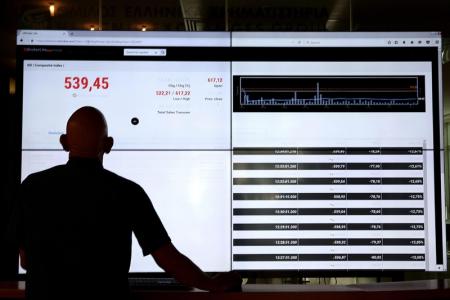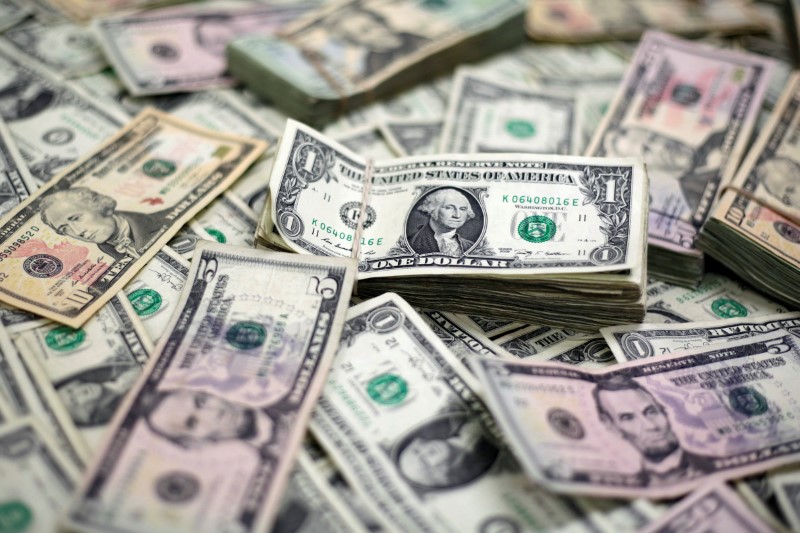Dollar, shares buffeted by trade war worries
Reuters
Published Mar 22, 2018 09:08AM ET

Dollar, shares buffeted by trade war worries
By Marc Jones and Alasdair Pal
LONDON (Reuters) - The threat of a global trade war and a steady message from the Federal Reserve on U.S. interest rates pushed the dollar to its lowest in over a month on Thursday, and took Europe's main share markets into the red.
It was the dollar's third decline in four sessions and helped Britain's pound
The Fed raised its key rate by 25 basis points to 1.75 percent on Wednesday and flagged at least two more increases were likely this year. But it stopped short of pointing to the three that some economists had been predicting.
China also nudged up its borrowing costs overnight, as Beijing braced for new tariffs from U.S. President Donald Trump on Chinese imports worth as much as $60 billion.
Not all Fed bulls were discouraged, though. "Over the balance of the year we do think they will move to four hikes," said JP Morgan Asset Management's Seamus Mac Gorain, highlighting the impact of recent fiscal stimulus.
Trade tariffs were a risk but more open economies such as Mexico or the euro zone could be more at risk than the United States, he said.
Those jitters, plus weaker-than-expected German business confidence data, caused European shares (STOXX) to fall 1 percent to a two-week low.
U.S. stocks were also set to open lower, with S&P 500 futures (ESc1) down 0.7 percent in pre-market trades.
Shares in tech giant Facebook (NASDAQ:FB) were set to fall for a third successive day after its chief executive Mark Zuckerberg apologized for a "major breach of trust" over how it had handled data belonging to 50 million users.
In the currency market, the British pound
The Bank of England kept rates steady on Thursday but two of its policymakers unexpectedly voted for an immediate rate rise, in a statement that will boost investors' confidence that borrowing costs will rise in May.
Bond yields - which move inversely to price - fell broadly. Borrowing costs on 30-year German debt hit their lowest level of the year.
Two-year U.S. yields slipped to 2.305 percent (US2YT=RR) from 9 1/2-year high of 2.366 percent. The 10-year yield fell below 2.85 percent (US10YT=RR), its biggest move in three weeks.
"The threat of protectionism is dampening the mood in the German economy," said Clemens Fuest, the chief of the Munich-based Ifo institute, which published the business sentiment data.
(For a graphic on U.S. imports from China click http://tmsnrt.rs/2FMsz1Q)
TRADE WAR OR JUST WAR
MSCI's broadest index of Asia-Pacific shares outside Japan (MIAPJ0000PUS) ended almost flat, a 1 percent drop in Chinese and Hong Kong stocks (CSI300) offsetting gains elsewhere.
Japan's Nikkei (N225) rose 1.0 percent as investors went bargain hunting after a difficult run for the market.
China hopes it can hold talks with the United States to achieve a "win-win" solution on trade, Foreign Ministry spokeswoman Hua Chunying said in Beijing.
But worries were swirling of a more traditional kind of war. A widely read Chinese state-run newspaper said on Thursday that the country should prepare for military action over Taiwan.
Beijing was infuriated after Donald Trump signed legislation last week that encourages the United States to send senior officials to Taiwan to meet Taiwanese counterparts and vice versa.
Concern about a trade war between the world's two largest economies also put commodity markets on guard.
Oil prices gave up earlier gains to leave Brent crude futures (LCOc1) at $68.98 per barrel and U.S. crude (CLc1) at $64.76 a barrel.

Copper
Written By: Reuters
Trading in financial instruments and/or cryptocurrencies involves high risks including the risk of losing some, or all, of your investment amount, and may not be suitable for all investors. Prices of cryptocurrencies are extremely volatile and may be affected by external factors such as financial, regulatory or political events. Trading on margin increases the financial risks.
Before deciding to trade in financial instrument or cryptocurrencies you should be fully informed of the risks and costs associated with trading the financial markets, carefully consider your investment objectives, level of experience, and risk appetite, and seek professional advice where needed.
Fusion Media would like to remind you that the data contained in this website is not necessarily real-time nor accurate. The data and prices on the website are not necessarily provided by any market or exchange, but may be provided by market makers, and so prices may not be accurate and may differ from the actual price at any given market, meaning prices are indicative and not appropriate for trading purposes. Fusion Media and any provider of the data contained in this website will not accept liability for any loss or damage as a result of your trading, or your reliance on the information contained within this website.
It is prohibited to use, store, reproduce, display, modify, transmit or distribute the data contained in this website without the explicit prior written permission of Fusion Media and/or the data provider. All intellectual property rights are reserved by the providers and/or the exchange providing the data contained in this website.
Fusion Media may be compensated by the advertisers that appear on the website, based on your interaction with the advertisements or advertisers.